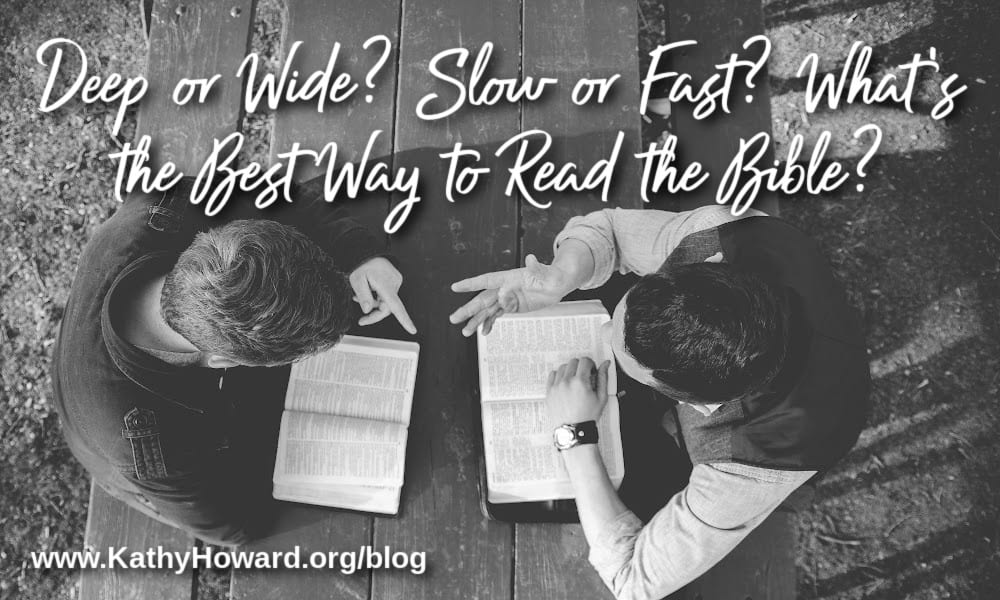
Women often ask me about the best way to read the Bible. “Should I read it all the way through or should I slow down and read one book at a time?”
My answer is “YES.” Stay with me. I’ll explain.
More than three decades ago, when I first fell in love with God’s Word, I didn’t have the tools to really study the Bible for myself. So, I devoured all the in-depth Bible studies I could get my hands on – particularly Beth Moore’s. For a while, I used these kinds of resources as the guide for my time in God’s Word.
Then I realized I could – and should – go straight to God’s Word myself. Published Bible studies are wonderful resources and supplemental studies. But with the Holy Spirit as our Teacher, we can learn straight from the Bible.
For several years I used a “Read-the-Bible-Through-in-a-Year” plan. Then I realized I felt rushed. The amount of reading required each day kept me moving quickly. I got to where I just wanted to check the box.
A Change in my Own Reading
I really longed to slow down and take my time. So, I made a change.
In recent years, rather than going “wide” and covering all 66 books in 12 months, I’ve been going “deep.” I take a slow, purposeful pace through one Bible book at a time. Depending on the book, I read on average about 15-30 verses a day. This pace allows me to observe and interpret the passage using my simple inductive method the 4-R Bible Study Method.
So, back to the first question. Which is the best way to read the Bible? Wide and fast through the whole Bible in a year or less? Or, slowing down and going deep?
Yes. We need both.
We Need Wide
Reading through the whole Bible in a relatively short period of time – a year or less – helps us see the “Meta-narrative” or big story of Scripture. We need to see how all the individual pieces fit together and the full scope of God’s big plan. Understanding the whole Book helps us better understand each book. (Also see “How Literary Context Aids Our Understanding.”) Reading individual books without that big picture understanding is like watching the 4th Star Wars movie before you’ve seen movies 1-3.
We Need Deep
Once we have a feel for the Meta-narrative, not only will the pieces make more sense we will also enjoy them more. We will see truths we would otherwise miss.
Slowing down gives us time to reflect and savor. It gives God room to embed His truths in our hearts and use them to shape our character and refine our faith. Going slow gives God time to “catch us.”
A slow, deep pace plants God’s Word in our hearts where it can take root and grow.
Never read the Bible through before?
If you’ve never read the whole Bible through in a year or less, I highly recommend that you do. I’ve got a couple of reading plans on my website that can help. One reading plan takes you straight through the Bible from Genesis to Revelation. Another one, organized chronologically, will take you through most of Scripture in the order things happened historically. (The Bible is organized by category rather than chronologically. See “How is the Bible Organized?” for more.)
Pastor Lamb’s Reading Plan – This Bible reading plan, which takes you through the entire Bible in a year, was compiled by one of my former pastors. It includes reading assignments for every day of the week.
Chronological Plan – If you’ve never read through the Bible before or you don’t currently read your Bible at least five times a week, I suggest you begin with this plan. Although it doesn’t cover every single Bible book and verse, you will read through all the major stories and key passages of Scripture in chronological order. And it includes just 5 reading assignments a week.
Ready to dive deep?
If you feel you have a decent grasp of the Big Story, try slowing down and savoring one book at a time. Here are a few tips:
Have a plan for reading – Pick a book of the Bible you’re interested in or find a plan that works for you. Check out the five “Book by Book” plans on my Resource Page. They take you through individual books at a slow pace.
Start with the book’s Background – Before you start reading, find out the background info like who wrote it, who it was written to, and why it was written. It will lay the right foundation for your reading. For help see “First Steps to Study a Bible Book.”
Consider how you’ll “digest” what you read – There are right ways and wrong ways to study Scripture. A faithful Bible student uses good study tools. One simple, but solid, study method is the 4 R Bible study method.
What’s your current reading style? Wide or deep?


Titus Bible Study
Join Kathy's mailing list to receive a free mini Bible study on the book of Titus.
Success! Check your inbox for the download link.